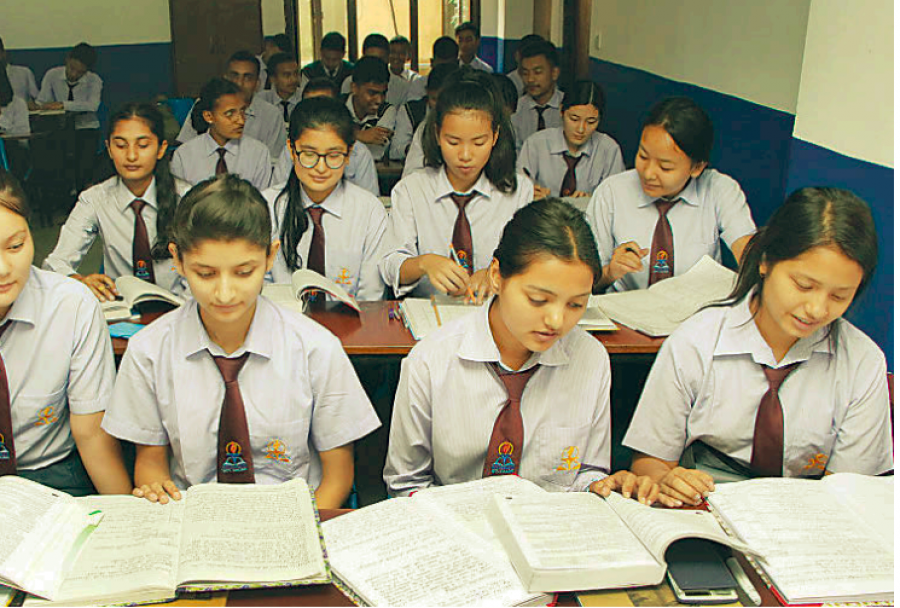National
Government plan to introduce new school curricula suffers setbacks
Schools and teachers say the government should postpone the plan considering the pandemic.
Binod Ghimire
Nepal government’s plan to gradually phase out the existing school curricula and replace them with new ones has faced one after another setback.
The government on September 6, 2019 adopted the National Curriculum Framework with a plan to replace the old curricula in four years starting 2020. Last year, it directed all the schools to adopt new curricula for grades one and 11.
However, its plan faced a setback as the private schools were reluctant to adopt the new curriculum mainly for grade 11. They said it was wrong to implement the new curriculum in the time of the pandemic as they didn’t have time to train the teachers on the new curriculum. Following their refusal, the Education Ministry on October 20 issued a circular to all the schools across the country saying no excuse for non-implementation of the new curricula would be entertained. It also asked guardians to ensure before enrolling their children that the respective schools have adopted the new curricula.
The schools continued to ignore the government’s directive until the Supreme Court in January directed all the schools to adopt the new curricula.
The government is facing a similar setback even this year. The curricula for grades 2, 3, 6 and 12 are to be replaced in the new academic session, which commences next week. As per the directive from the federal government, a majority of the local governments are preparing to start the academic session from June 15.
Although private schools haven’t directly challenged the government instruction, they say the pandemic has posed a challenge in jumping to the curricula. DK Dhungana, co-president of the Private and Boarding School’s Organisation Nepal, said it doesn’t seem possible to fully adopt the new curricula.
“We haven’t been able to orient and train our teachers on the new curricula,” he told the Post. “We don’t think new textbooks will be available as the Covid-19 pandemic has affected the publication work.” Dhungana said although they welcome the government plan, the time now is not suitable for shifting to new curricula. He said every programme that goes into implementation without proper preparations doesn’t yield expected results.
The teachers from private schools share a similar view. They say the government should reconsider its plan. “The government should postpone the plan until the situation eases,” Hom Kumar Thapa, chairperson of the Institutional Schools Teachers’ Union, told the Post. “Just conducting teaching-learning activities alone is not enough because the students should get the knowledge a particular curriculum intends to impart. For this, the teachers must be trained on the new curriculum.” He said private schoolteachers haven’t even received basic orientation on the new curricula although the government plans to start the new session in a few days.
As per the new curricula students from grade six to eight have to study Nepali, English, Mathematics, Science and Technology, Social Studies and Human Value Education, Health and Physical and creative skills and mother tongue or the local curriculum or Sanskrit. The students for grade four and five have the similar subjects except that they don’t have Sanskrit as one of the elective subjects.
Similarly, under the new academic setup, students will have to study six subjects each in grades 11 and 12 instead of the five at present. Three of these subjects are compulsory—English, Nepali and Social Studies in grade 11 and Life Skills Education in grade 12—and students can choose three others as per their interest. There are 80 elective subjects divided into four groups and mathematics is one of them.
The new courses, according to the Curriculum Development Centre, have been designed to switch to a single-track curriculum for grades 11 and 12 from a system of four disciplines currently in practice. Students after grade 10 Secondary Education Examination are currently enrolled in Science, Management, Humanities and Education.
Despite the reluctance of the private schools, the government appears resolute in its plan. A meeting of the Central Level Textbook Monitoring Committee on Friday decided to strictly monitor to ensure that all the students have received the textbooks as prescribed by the Curriculum Development Centre on time. The committee led by the director general at the Centre for Education and Human Resource Development has asked the private textbooks publishers and Janak Shikshya Samagri Kendra, the government entity responsible for publishing the textbooks for public school students, to ensure there is no shortage of the textbooks of the new curricula.
“The committee has decided to start the monitoring very soon,” Suprabhat Bhandari, president of Nepal Guardian Federation who also is a member of the monitoring committee, told the Post. “It is necessary that students get to study the courses prescribed by the government.”




 9.89°C Kathmandu
9.89°C Kathmandu














